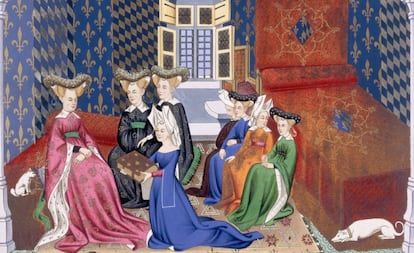Plagues, famine, torture: historians try to set the record straight on the Middle Ages
Over 70 Spanish scholars have signed a manifesto underscoring the positive aspects of a period spanning nearly 1,000 years, including advances in law and politics

Rotten teeth, famines, plagues, routine torture, bodies hanging outside cities to “greet” visitors, feudal lords exercising their droit du seigneur to sleep with young women on the latters’ wedding night...it’s hard to deny that the Middle Ages have had some really bad press.
So much so, that Spain’s top scholars of medieval history have signed a manifesto defending the good name of the period they have devoted their career to. The Middle Ages, they say, are an essential time to understand the world we live in today. Without medieval times, we wouldn’t have the majority of languages that we speak today, there would be no time measurement, or many of the recipes that we use to prepare our favorite meals, or even some of the cities that we live in. We wouldn’t even know about the ancient Greek and Roman classics, since these works were preserved in medieval monasteries.
“We can say that ‘medieval’ has been used to describe anything related to backwardness, ignorance, lack of culture, unwholesome habits, barbarity, cruelty, fanaticism, horror, poverty, monstrosity, violence...” reads the manifesto that emerged from a seminar titled The medieval legacy, organized by María Jesús Fuente and held at the Julio Caro Baroja Historiography Institute at Carlos III University in Madrid, where De la Fuente is an emeritus professor in medieval history.

“The word carries a stigma that scholars of medieval history endure stoically, but during this pandemic year, the use of the term has been expanded to describe a diversity of issues,” reads the text, which was signed by over 70 researchers from Spain’s main universities. “And so you find statements such as ‘don’t be medieval and support science and medicine,’ or ‘a medieval Left that thinks of itself as sophisticated.’”
The Middle Ages’ bad reputation extends to politics, journalism and to every corner of popular culture. In the movie Pulp Fiction, the gangster Marsellus describes his plans to torture a man with a line about getting “medieval on your ass.”
“The Middle Ages are a period of light,” says María Jesús Fuente alluding to medieval illuminated manuscripts. Fuente, who last year received the Leonor de Guzmán Essay Award, feels that the period “has either been very idealized or considered accursed.” The historian notes that the bad press began right around the time when someone came up with the term during the Renaissance, and that leading thinkers such as Voltaire helped disseminate fake news about the Middle Ages.
Alberto Montaner, one of the biggest experts on the historical figure of El Cid, notes that it was in fact the most enlightened individuals of this period who created the worst stereotypes about the Middle Ages because they viewed it as “the age of feudalism politically, and of obscurantism intellectually.”
“That led to images of the Middle Ages as a time filled with dungeons, witch-hunts and heretics burnt at the stake. In reality, the Inquisition as it was known in the 18th century took shape at the beginning of the Modern Age (late 15th century), and witch-hunts were unknown during the Middle Ages: they developed between the 15th and 17th centuries,” he adds.

Asked what medieval times have given the world, the answers were plentiful. “Castilian Spanish,” says Ricardo Córdoba, a professor of medieval history at Córdoba University. “It is a medieval language. The division of time, the method to count dates based on the birth of Jesus Christ, Spain’s current administrative division into regions, all that is absolutely medieval. And with a few exceptions, we are still using names for newborns drawn from the saints. And that is without even mentioning our gastronomy.”
Respondents also frequently mentioned universities, environmentally sound agricultural practices, the presence of minorities in the fields of law and medicine, and algebra, developed by the Islamic world.
Isabel del Val, a professor at Valladolid University, feels that the stereotypes are partly due to the fact that the Middle Ages are a very long period of time spanning nearly 1,000 years, from the end of Ancient Rome to the Renaissance. And that means that some sub-periods are better known than others. “There is a greater distance [in time] between the beginning and end of the Middle Ages than between ourselves and the discovery of America,” she notes.
The role of women in society was also much more important than many of us might believe, adds Del Val. “In the 9th century, a woman named Duoda was living in her husband’s estate. He was a high-ranking official of the Carolingian dynasty. She wrote a book for her son, and ran the family estate. Was it a dark age? We don’t know a lot, but it doesn’t seem very dark.”
Ana Echevarría Arsuaga, of the distance university UNED, focuses on the role of queens and religious minorities. “The rights of women from the 11th century to the 15th or 16th centuries included the right to manage property in a way unseen in Europe. The women of that era had more possibilities of managing properties than women in the early 20th century.”
Remedios Morán Martín, an expert in the history of law at UNED, adds another medieval contribution to modern times: laws. “During the High and Late Middle Ages, the spaces of the various kingdoms and counties were much more consolidated, and it was possible to act more efficiently from the viewpoint of creating new institutions to enable royal power. Among these institutions in Spain, there was the birth of the Cortes, a parliamentary body that met in León in 1188 and was a world pioneer,” she says.
“We tend to forget that the Middle Ages are there in our everyday lives: the fork, paper bills, glasses, mechanical clocks, books, printing presses and rose water all come from that period,” adds the manifesto. “But beyond inventions, the medieval centuries were great creators of structures – social, territorial, political and educational – that are an invitation to reflect on the path that’s been covered between then and now.”
English version by Susana Urra.
Tu suscripción se está usando en otro dispositivo
¿Quieres añadir otro usuario a tu suscripción?
Si continúas leyendo en este dispositivo, no se podrá leer en el otro.
FlechaTu suscripción se está usando en otro dispositivo y solo puedes acceder a EL PAÍS desde un dispositivo a la vez.
Si quieres compartir tu cuenta, cambia tu suscripción a la modalidad Premium, así podrás añadir otro usuario. Cada uno accederá con su propia cuenta de email, lo que os permitirá personalizar vuestra experiencia en EL PAÍS.
¿Tienes una suscripción de empresa? Accede aquí para contratar más cuentas.
En el caso de no saber quién está usando tu cuenta, te recomendamos cambiar tu contraseña aquí.
Si decides continuar compartiendo tu cuenta, este mensaje se mostrará en tu dispositivo y en el de la otra persona que está usando tu cuenta de forma indefinida, afectando a tu experiencia de lectura. Puedes consultar aquí los términos y condiciones de la suscripción digital.









































